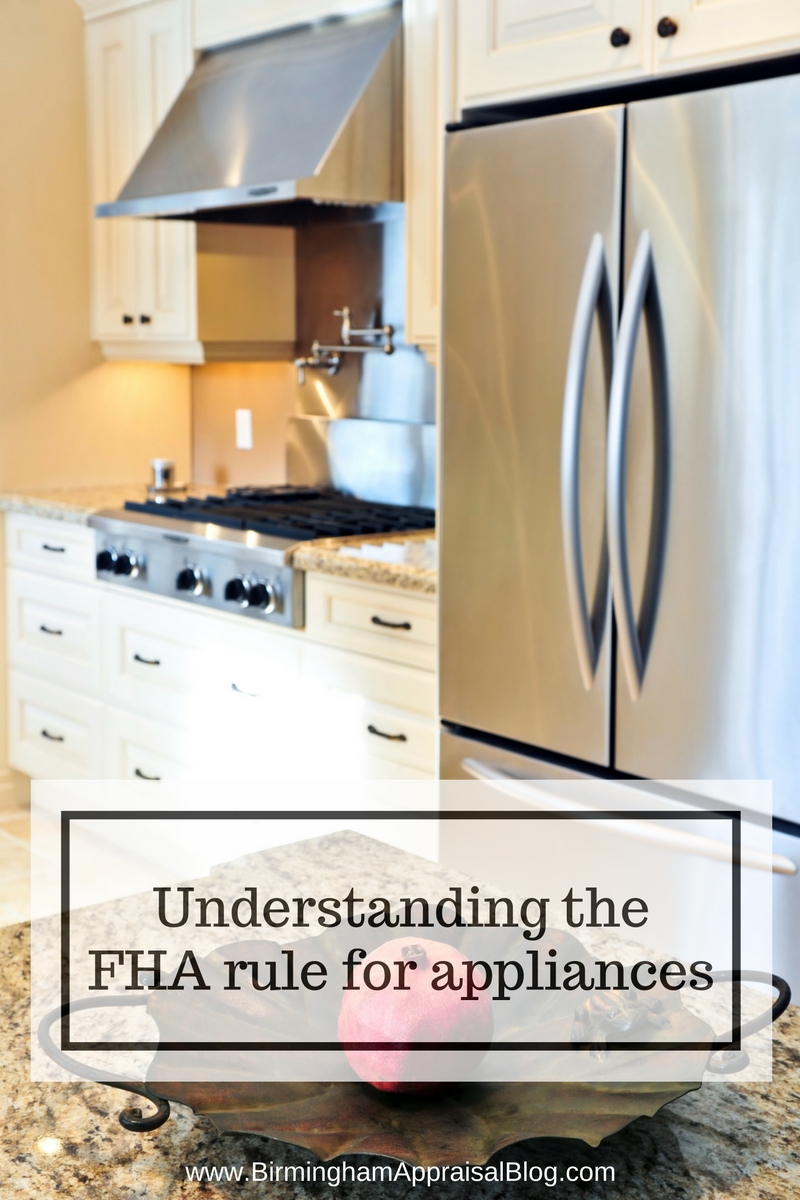Understanding the FHA rule for appliances
 Are you confused about the FHA rule for appliances in the homes you are selling? If so you will want to continue reading so you’ll understand how it is handled in the appraisal. Agents that are proactive will help expedite the appraisal process and minimize delays in closing.
Are you confused about the FHA rule for appliances in the homes you are selling? If so you will want to continue reading so you’ll understand how it is handled in the appraisal. Agents that are proactive will help expedite the appraisal process and minimize delays in closing.
Are appliances required in an FHA appraisal?
The new FHA/HUD handbook requires the appraiser to note what appliances are present in the house and indicate whether they are considered to be real or personal property.
Appliances that are typically considered personal property include slide in refrigerators, counter microwaves, and any other appliance that is not built in and easily removable. These types of appliances are not included in the appraiser’s final opinion of value.
Appliances classified as real property include dishwashers, range/oven and fan/hood, built-in microwaves, and built-in refrigerators such as sub zero style units. These appliances are included in the appraiser’s final value opinion.
Appraisers are not required to “test” the appliances but rather operate the ones that are being conveyed in the sale and observe their operation and performance. I will usually turn on the appliance for a couple of minutes and observe whether it appears to be operating normally. If it does not appear to be working properly this is noted in the appraisal. I describe within the report this process and the outcome so that the underwriter, who is responsible for the final call, can make an informed decision.
If an appliance is included in the sale but it does not work it must be noted in the appraisal. As you might expect, since the appraiser is operating the appliances the ELECTRICAL SERVICE MUST BE ON. This is usually not an issue, however with foreclosure homes this may not be the case.
The agent must make sure that electricity is turned on before the appraiser visits the property or the appraisal will be subject to it being turned on. This will create additional expense to the buyer and delay the loan process as the appraiser will be required to go back to the house after the power is turned on to finish the appraisal requirements.
What if an appliance is missing?
A missing appliance is not an appraisal deal killer but certain guidelines are required. If an appliance is missing there must not be any items present that create a health and safety risk.
Examples of this include exposed wiring or gas pipes that are not capped. If a built-in microwave was removed, and exposed wires were left, this could create a safety hazard. If an appliance does not work and will not be included in the sale, and you want to remove it make sure no exposed wires are left. Also make sure any disconnected pipes are sealed off so that no health or safety hazards exist.
Question
If you’re an agent do the FHA rule for appliances I described above make sense? If you have any additional questions leave a comment below and we’ll keep the conversation going.
If you liked this post subscribe by email (or RSS feed). Thanks for visiting.
Hi Tom, I work on the FHAG end of the sprectrum in other words all the ground floor units required to be FHAG adaptable accessible. In this article, you mentioned “Appliances classified as real property include dishwashers, range/oven and fan/hood, built-in microwaves, and built-in refrigerators such as sub zero style units. These appliances are included in the appraiser’s final value opinion”. The word Microwave is not listed in the Fair Housing Act Guidelines for adaptable accessibility but the word oven is in the description for a built in Microwave Oven. Would you happen to know if a built in microwave oven is considered an oven covered by the FHAG accessibility compliance?
Jean, I am sorry but I do not know if a microwave oven would be covered under FHAG guidelines.
Great post Tom. That answers a lot of the questions that real estate agents often have about appliances and how they relate to FHA or HUD appraisals.
Thanks Gary. I know it is little more work for them but I believe that taking care of this upfront can save headaches and delays on the sales transaction.
So would it work if all appliances were removed (assuming there were no wires or safety issues)? I wasn’t sure based on the post. I’d love to hear your take. Great stuff as always, Tom.
Great question Ryan. HUD Handbook 4000.1 states that “Cabinets and built-in appliances that are considered Real Property must be present and operational.” and then in goes on to say “The Appraiser must note appliances present in the house at the time of observation and indicate whether that appliance is considered Personal Property or Real Property. The Appraiser must operate all conveyed appliances and observe their performance.”
To me this was a little confusing because the first part seemed to infer that those appliances in a house that are considered to be real property, such as range/oven, dishwasher, etc. “must be present and operational”. After doing some research what I believe this to mean is that appliances do not have to be present, however if they are, and they are considered to be real property, they must operate. Is this the way you take it? I’d like to hear your interpretation as well as other appraisers.
Good info, Tom. One detail I’ve run into a few times during FHA inspections is a faulty igniter on one burner of a gas stove top. I always check every burner and the oven igniter on a gas appliance.
Thanks for the tip Dave!